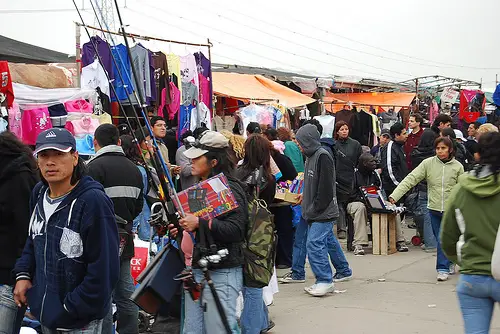No Salad Days at the Buenos Aires Thieves Market
By Camille Cusumano
"Everywhere I look I see dead eyes," thinks a Buenos Aires expat as she visits the Feria la Salada, a market that lives up to its reputation for danger and desperation.
"You cannot go to this market, es muy peligroso," said my friend Carmen. I watched her big blue eyes bug out, emphatic with the probability of harm befalling me if I went to Feria la Salada. We sat in the comfort of my 10th floor apartment in Recoleta, Buenos Aires's upper-crust barrio. Another Argentine friend, Oscar, nodded in agreement with Carmen. I had just greeted him hello and noticed his neck was fragrant with Paco Rabanne cologne—real Paco, not the knock-offs reportedly available at the market in question.
"Oh, but I have a private bodyguard," I joked, referring to a fellow journalist, Marc Haefele, from Los Angeles, who had invited me to check out the market with him. He piqued my curiosity, saying, "La Salada is a thieves market." It was the world's largest illegal market, he told me, denounced by the European Union, but locally pronounced unstoppable because tens of thousands of customers support it weekly.
The hints at danger, which I often find exaggerated by locals who listen to the news more than I do, ramped up my desire to take a glimpse. I had been living in Buenos Aires for nearly three years, absorbing the culture mainly in sultry tango dance halls and classes. I was streetwise enough to deal with rowdies and mischief makers. Besides, I wanted to get out of my complacent routine here in chic Recoleta. That black market was said to sprawl in a malignant belt of land, replete with polluted meadows, just south of Buenos Aires. Time to get a close-up view at the underbelly of my adopted home, I mused.
Oscar, who like Carmen, had never set foot near La Salada, said dismissively, "It's full of the junk they sell at Retiro bus station." The Retiro was one of my favorite offbeat places in the city. (Only once did I have to shrug off would-be pick-pockets.) My mind kneaded a vision of stall after stall with Hong-Kong-like knock-offs crossed with Tangiers' bazaar-like ambience. It's big, it's unstoppable, and it makes the news regularly. So there must be something to see at La Salada.
The market opens at 3 am on Sundays. Mark said we had to get there early to get the good stuff. So we met at my place at 5 am and hailed a taxi. The first driver said, "No, I don't go to La Salada, too dangerous," and took off. The second taxi said the same and sped off. The third one, a good-natured driver, said, "I'm heading home that way, so I'll drop you." He asked which point of entry did we prefer, Punta Noria or Punta Mogote. "Whichever is safer," I said. "That would be Mogote," he said.
A Rank River and the Dregs
La Salada started in 1991 when a handful of Bolivians set up shop on the forgotten land near a rundown swimming pool park long past its prime. They found it profitable to sell "imported" clothes at a market they called Urkupiña. Eventually two more markets sprouted and joined forces. According to La Nacion, the gangly collection of flimsy bamboo-and-sheet-metal booths or warehouses on 20 hectares of the banks of the River Riachuelo moves some $9 million weekly and employs 6,000 people to serve the 20,000 customers who come from all over the country. And it's all illegal.
As we rolled along the ingress road, Marc told me that indeed the land here was designated during the Juan Peron years (half a century ago) as a resort for the poor. The roadside was now lined with billowing tall grasses, reeds, willow trees and a deep layer of the usual Styro-plastic urban trash, bagged and otherwise, no less visible than if the place were a designated dump. A vivid heap of some synthetic fabric cuttings in a fluorescent rainbow of colors that might have been pretty in another setting caught my eye.
As soon as Marc and I paid the cabbie, he spun around and high-tailed out of the no man's land. We joined an ant line of people (largely Bolivian, Peruvian, Paraguayan, and other much-lamented undocumented workers of Argentina). To get to the market stalls we had to cross the Riachuelo River, rank with years of slaughterhouse detritus and god knows what else. I started having my first misgivings.
The river was so thick with trash you could cross it on foot but risk its flesh-dissolving waters. No flora or fauna survived in it. The tonnage of humanity drawn to this Hades of merchandising had to use one of two pedestrian bridges, one more hair-raising than the other. We chose to walk the plank, a sling of metal, with jerry-rigged wire railing gone in most places. The thick, hideous stew of toxic garbage in the river below threatened life much more than the actual 30-foot fall. One blogger described the potential fall like "bungee jumping without a rope."
But the pilgrimage, four and five people deep, moved relentlessly to the altar of mercantilism. Just before Marc and I were to mount the metal sling, I spotted the three-cup monty, or shell game scam, off to our right. I wondered what sucker they were ripping off. Two men and two women were obviously in cahoots. How many times had I seen this game pulled off on unsuspecting riders of San Francisco's Muni bus—street guys getting 20 bucks a pop? Then, as I passed, one of the women tugged my arm lightly, not unfriendly, and encouraged me to play. It was me and Marc they'd had their eye on all the time. I had carefully dressed in loose cargo pants, all my few valuables in tightly zipped pockets. I wore my decrepit running shoes. I'm dark and Argentine looking, how could they spot me among the thousands of shoppers here?
"Get your hands off me," I scowled, angrily pushing the woman's hand away. "Fock you," she yelled violently after me.
"This isn't good, Marc," I said. "Getting into a defensive mode is not good." It was not even 6 am. I was cranky and not yet caffeinated.
In less than ten minutes we were across the river, joking about whether an engineer had lately examined the safety of the structure. I discreetly removed my 18-karat gold earrings from Florence and tucked them in a Velcro-locking pocket. I had brought my camera but would never take it out of my left zip-lock pocket.
We were in the heat of the market. We could only proceed with the packed crowds languorously. The flow was one huge sloe-eyed sea of poor people hungry for Stuff. Need or whim for that stuff could only be measured by the beholder. "Everywhere I look I see dead eyes," I muttered.
Copyright (C) Perceptive Travel 2012. All rights reserved.
- Setting Foot on Celtic Sod by Becky Garrison
- A Different State of Mine in Canada’s Yukon Territory by Bruce Northam
- World Music Reviews
- Travel Book Reviews
Books from the Author:

Buy Tango: An Argentine Love Story at your local bookstore, or get it online here:
Amazon US
Amazon Canada
Amazon UK
Fishpond (Australia)

Buy Italy, A Love Story at your local bookstore, or get it online here:
Amazon US
Amazon Canada
Amazon UK
Fishpond (Australia)

Buy Greece, A Love Story at your local bookstore, or get it online here:
Amazon US
Amazon Canada
Amazon UK
Fishpond (Australia)

Buy Mexico, A Love Story at your local bookstore, or get it online here:
Amazon US
Amazon Canada
Amazon UK
Fishpond (Australia)




